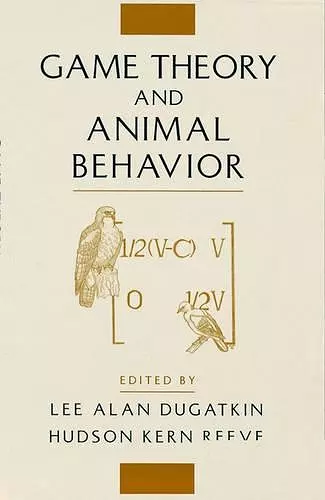Game Theory and Animal Behavior
Lee Alan Dugatkin editor Hudson Kern Reeve editor
Format:Paperback
Publisher:Oxford University Press Inc
Currently unavailable, and unfortunately no date known when it will be back

Game theory has revolutionized the study of animal behavior. The fundamental principle of evolutionary game theory--that the strategy adopted by one individual depends on the strategies exhibited by others--has proven a powerful tool in uncovering the forces shaping otherwise mysterious behaviors. In this volume, the first since 1982 devoted to evolutionary game theory, leading researchers describe applications of the theory to diverse types of behavior, providing an overview of recent discoveries and a synthesis of current research. The volume begins with a clear introduction to game theory and its explanatory scope. This is followed by a series of chapters on the use of game theory to understand a range of behaviors: social foraging, cooperation, animal contests, communication, reproductive skew and nepotism within groups, sibling rivalry, alternative life-histories, habitat selection, trophic-level interactions, learning, and human social behavior. In addition, the volume includes a discussion of the relations among game theory, optimality, and quantitative genetics, and an assessment of the overall utility of game theory to the study of social behavior. Presented in a manner accessible to anyone interested in animal behavior but not necessarily trained in the mathematics of game theory, the book is intended for a wide audience of undergraduates, graduate students, and professional biologists pursuing the evolutionary analysis of animal behavior.
an authoritative and widely accessible overview of the advances in this area * Ethology, Ecology, Evolution *
Describes many interesting examples of animal behaviour, including games between foraging producers and scroungers, reciprocal grooming in impala, territorial defence by birds and spiders, animal communication, parent-offspring conflict, and colony founding by ants. There are many accounts of experimental tests of game theory models, along with clear discussions of the limitations of the game theory approach. The quality of writing (often a problem in edited volumes) is uniformly good. The chapter by R. Gomulkiewicz is especially important, because it connects game theory, other optimization methods, and quantitative genetics with a focus on an empirical strategy for detecting adaptation and constraint. --Nature
The book is a worthwhile addition to graduate collections and some undergraduate collections emphasizing behavioral ecology, as most chapters are sufficiently general to be of use for a longer time than the typical symposium volume.--Choice
Listed in Wildlife Activist
ISBN: 9780195137903
Dimensions: 152mm x 229mm x 19mm
Weight: 494g
336 pages